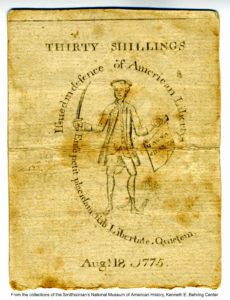 After the Battle of Lexington and Concord, which began the fighting in the American Revolution on 19 April 1775, the Continental Congress convened and had to deal with this new situation. One of the first actions was to appoint George Washington as commander-in-chief of the fledgling Continental Army that had surrounded the British troops in Boston.
After the Battle of Lexington and Concord, which began the fighting in the American Revolution on 19 April 1775, the Continental Congress convened and had to deal with this new situation. One of the first actions was to appoint George Washington as commander-in-chief of the fledgling Continental Army that had surrounded the British troops in Boston.
Washington’s name was put forward not only because he had some experience in the French and Indian War, but also because he was a Virginian. The delegates at the Congress didn’t want this military conflict to appear to be solely a Massachusetts issue; they wanted all the colonies to band together. By choosing Washington, they made a conscious effort to create colony-wide unity.
 Then the Congress went to work on a document that sought to explain why the situation had devolved into armed resistance. That document was called a Declaration of the Causes and Necessity of Taking Up Arms. While not as well known as the later Declaration of Independence, it was an elegantly written piece that clearly outlined the colonial position. Here are the main points spelled out in that document:
Then the Congress went to work on a document that sought to explain why the situation had devolved into armed resistance. That document was called a Declaration of the Causes and Necessity of Taking Up Arms. While not as well known as the later Declaration of Independence, it was an elegantly written piece that clearly outlined the colonial position. Here are the main points spelled out in that document:
- God never intended one part of humanity to hold unbounded power over another.
- Parliament exceeded the bounds of the British constitution.
- The colonies were founded by men who sought civil and religious liberty.
- Parliament has taken arbitrary control of the colonists’ property and lives.
- Peaceful reconciliation has not worked.
- The colonists would rather die as free men than to live as slaves.
- They had no desire for disunion.
- They felt assured of God’s protection in this endeavor.
Along with this document, the Congress composed another one that was called the Olive Branch Petition, which was softer in language and appealed to the king to hear their pleas.
 Both documents were sent to England but King George III paid no attention to them, issuing instead his official Proclamation of Rebellion on 23 August 1775. That proclamation stated that anyone in the colonies who was part of what he termed a “rebellion” was disloyal to the crown and out of his protection. Participants in this rebellion were to be put down by loyal subjects. When a king says that a subject is out of his protection, that, in effect, is a declaration of war against such subjects.
Both documents were sent to England but King George III paid no attention to them, issuing instead his official Proclamation of Rebellion on 23 August 1775. That proclamation stated that anyone in the colonies who was part of what he termed a “rebellion” was disloyal to the crown and out of his protection. Participants in this rebellion were to be put down by loyal subjects. When a king says that a subject is out of his protection, that, in effect, is a declaration of war against such subjects.
This proclamation, alongside what the colonists perceived to be a hostile attack upon peaceful citizens in Lexington and Concord, made it clear to many that the breach was now irreparable, but full recognition of that reality would not come until the middle of 1776.
Although I have been using the term “American Revolution” for this overall event, I really don’t think that is an appropriate designation. The colonists were simply trying to assert the rights and privileges they had had all along. They were defensive, not offensive. That’s why, as I hope many of my students will recall, I refer to this as the American War for Continued Self-Government, which, in my view, is a more accurate assessment.
Self-government, the right to make our own decisions without some overweening authority imposing everything, continues to be a concern in America today. We need to keep asserting the principle of self-government, particularly in a time when the federal government has taken on many of the attributes against which our forefathers fought.
